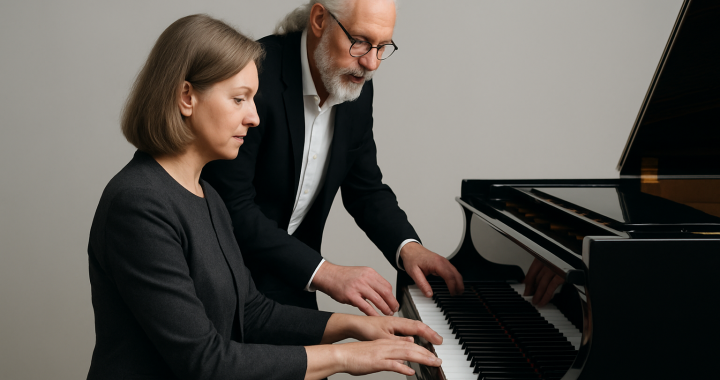
Piano lessons for students aged 50 or over: A Guide For Teachers
When we picture a beginner piano student, we often imagine a child perched on the bench with dangling feet. But in in my experience, a growing number of adults, particularly those over 50, are stepping into piano studios for the very first time. Some are taking the piano lessons they always wanted to, but their careers got in the way. Some are newly retired and finally have the time. Others are parents inspired by their children’s lessons - I had a father and son who came to me initially about lessons for the son. When the father saw my approach and how his son responded in lessons, he booked himself in too.
In my own practice, I also have 'beginners' at improvising, but who are enormously adept on the piano already, many having passed their grade 8 (ALCM etc) and beyond. These students are often just starting out with jazz, gospel, pop etc and want to express what they're hearing in their heads to the same level as they do reading 'dots on paper'. The method of teaching these students differs substantially from standard classical techniques and requires a high level of practical experience and technique that is not catered for in the trajectory of standard music college performance education.
For teachers, taking on older students can be deeply rewarding, but also challenging. Standard children’s 'piano method' books often don’t fit, and adult learners bring a very different mindset to the piano. Here are some practical strategies to help older beginners succeed and thrive.
1. Shift the Mindset: From “Too Late” to “Just Right”
Many adults over 50 arrive with doubts: Am I too old? Will my fingers work? Is my memory good enough? A teacher’s first job is to reframe these fears. I remind them that music is not a race, and we should enjoy the process. Learning is about enjoyment, creativity, and personal growth, not a competition. Encouragement and reassurance are key factors in helping piano students to relax and stay committed.
2. Set Clear, Achievable Goals
Children are often motivated by exams or parent's expectations. Adults, however, thrive on concrete, personal milestones. Learning to play a favorite song, accompanying a grandchild’s singing, or preparing a piece for a small family gathering can be far more meaningful than passing Grade One. I tend to break students' goals into small, manageable steps, so their progress feels tangible.
3. Choose Repertoire They Love
One of the greatest strengths of teaching older adults is their rich musical taste. Many have decades of listening behind them and know exactly what music inspires them. Use this to your advantage. Instead of relying solely on method books, introduce arrangements of jazz standards, folk tunes, or even film themes. When the music feels relevant and inspires us, practice becomes a joy.
4. Focus on Healthy Technique Early
Older beginners may worry about stiffness, arthritis, or hand injuries. Gentle technical work, focusing on relaxation, posture, and ergonomics is essential. Short, mindful warm-ups and exercises that avoid tension can help us play comfortably and with confidence. Think “longevity of hands” rather than “speed of scales.” I personally took a course in Alexander Technique for piano teachers to help with the more physical aspects of piano playing and it not only changed how I teach, it revolutionised my own playing!
5. Adapt Practice Expectations
Many adults juggle work, caregiving, and other responsibilities. Long daily practice sessions are often unrealistic. Instead, encourage frequent, short sessions — even 30 minutes of focused practice can lead to steady progress. Emphasize quality over quantity: mindful repetition is more effective than marathon practice sessions.
6. Build Confidence Through Small Wins
Stage fright is common at any age, but adults often carry a special fear of embarrassment. Low-pressure performance opportunities can make a big difference - from playing for one trusted friend to recording a short video for themselves. Celebrate every achievement, however small. Confidence builds gradually. I generally organise a small low key 'recital' for a handful of my students at a local piano rehearsal studio. The warmth and encouragement in the room is tangible when we get together and it's the perfect environment for my students to play in front of each other, without the pressure of a full-blown performance.
Final Thoughts
Teaching beginners over 50 is not about racing through a syllabus or pushing toward exams. It’s about opening a door they may have thought was closed forever. These students bring life experience, patience, and passion — and with a supportive teacher, they can discover a new and lasting source of joy at the piano.
Far from being “too late,” the best time to start learning is whenever the student is ready. And for many, that moment is right now!